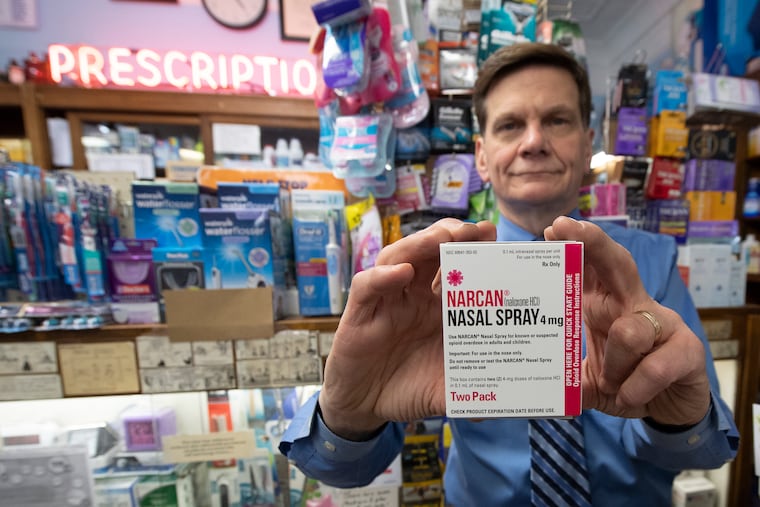With Narcan, government intrusion is being forgiven | Stu Bykofsky
Two trade organizations representing pharmacists are not objecting to a bill sponsored by Councilman Bobby Henon that would require pharmacists to stock at least two cartons of Narcan.

You know how bad the opioid crisis is?
So bad that Philadelphia drugstores would be forced — by a precedent-setting law — to stock Narcan on their shelves, and none of them are screaming bloody murder about it.
In fact, two trade organizations representing pharmacists — one city group, one statewide — are not objecting to a bill sponsored by Councilman Bobby Henon that would require pharmacists to stock at least two cartons of Narcan. That is the brand name of the overdose-reversing drug known as naloxone. No prescription is required.
Pharmacies also would be required to post a notice saying they have it in stock and would be fined $250 for each day they do not.
"A lot of pharmacists were dispensing it anyway," says Patricia Epple, CEO of the Pennsylvania Pharmacists Association, "but I've heard from others that any time you put a mandate in it, there is a concern."
More than a concern to me, it is an intrusion. Products have been banned in the past for being dangerous, but are there any other products that stores are required to carry?
"Not that I'm aware of," says Epple.
Henon says the city Law Department told him the bill was constitutional. I could not get a comment from the National Constitution Center, but the ACLU says it knows of no similar law. Despite the good intentions of trying to reduce the 1,200 overdose deaths Philly sustained last year, this bill is heavy-handed.
"I have 22 pharmacies in my district," Henon told me during an interview in his office. "The majority of them did not have it on their shelves." His district runs from Port Richmond up through the Northeast.
The Philadelphia Department of Health says 75 percent of Philadelphia's estimated 400 pharmacies already carry Narcan. Only 100 don't.
CVS, Rite Aid, and Walgreens all carry it, I'm told by Health Department spokesperson Jim Garrow, and they are everywhere.
What's more, since June 2017, the Health Department has handed out 57,000 doses, free of charge.
That's free to the user. The city pays $75 for a two-dose kit and distributes it to first responders, says Garrow, "and community organizations that have regular contact with the population that needs this medication." So Henon's bill isn't necessary, because anyone who wants Narcan can easily get it.
Garrow says that some of the small pharmacies are the biggest boosters of carrying Narcan.
Walter Cwietniewicz, who runs the Ellis Pharmacy on Brown Street in Fairmount, tells me he carries it because it's the right thing to do.
"You have to have it in stock when customers need it," he says. He carries two packs that are priced at $139.95 each. "I make $20," he says, adding that insurance usually pays for the dose.
The Philadelphia Association of Retail Druggists may not agree with many of the government mandates it has been burdened with over the years, but "in this case, we think it is something every store can carry," says Executive Director Mel Brodsky.
Of course they can — and should. But "carry it, or else"? My colleague Mike Newall says "yes," even while acknowledging that most pharmacies already do.
The Greater Philadelphia Chamber of Commerce, which generally resists new demands on business, took no position on Henon's bill.
It's unusual that no pro-business group resisted Henon's groundbreaking legislation.
I think I know why.
Oppose it and you will be painted as someone who doesn't care when someone overdoses and drops dead on the sidewalk.
Henon said he was told by a pharmacist, whom he would not name, "Why should we be helping them?" I found another one who is opposed — he felt it was government intrusion — but he was not willing to have his name used.
Their reluctance to be identified is not surprising. Pharmacists pushing back against the legislation would draw more condemnation than people trapped in addiction.